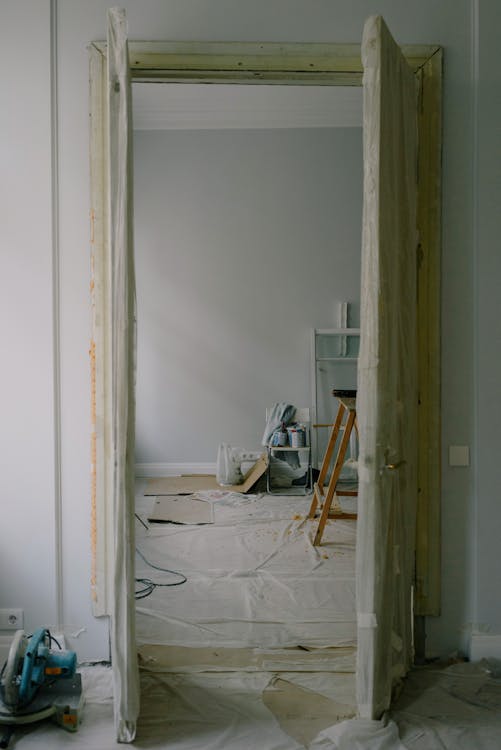Flipping Houses vs. Rental Properties
You should also take into consideration the opportunities presented by the existing market. Here is a look at what is involved in pursuing each strategy and how to decide which one might be right for you.
- Flipping properties and buying and holding real estate represent two different investment strategies.
- Owning real estate offers investors the opportunity to accumulate wealth over time and avoid the stock market’s ups and downs.
- Flipping can provide a quick turnaround on your investment and avoids the ongoing hassles of finding tenants and maintaining a property, but costs and taxes can be high.
- Buy-and-hold properties provide passive monthly income and tax advantages, but not everyone is prepared for the management and legal responsibilities of being a landlord.
 Why Invest in Real Estate?
Why Invest in Real Estate?
That’s a good question. Residential real estate ownership is gaining ever-increasing interest from retail investors for many of the following reasons:
- Real estate can provide more predictable returns than stocks and bonds.
- Real estate provides an inflation hedge because rental rates and investment cash flow usually rise by at least as much as the inflation rate.
- Real estate provides an excellent place for capital in times when you’re unsure of the prospects for stocks and bonds.
- The equity created in a real estate investment provides an excellent base for financing other investment opportunities. Instead of borrowing to get the capital to invest (i.e., buying stocks on margin), investors can borrow against their equity to finance other projects.
- The tax-deductibility of mortgage interest makes borrowing against a home attractive.
- In addition to providing cash flow for owners, residential real estate can also be used for a home or other purposes.
Should You Buy and Hold Real Estate or Flip Properties?
One key distinction between buying and holding and flipping properties is that the former can provide you with passive income, while the latter offers active income.
Passive income is money that is earned on investments that continues to make money without any material participation on your part. It could be from stocks and bonds or from owning rental property and receiving rental income each month, provided you hire a management company to do all the required tasks, such as finding tenants, collecting rent, and taking care of maintenance.
Active income is money that you earn in exchange for the work that you perform. That includes your salary from work, as well as the profits you make flipping houses. Flipping is considered active income, regardless of whether you are doing the physical labor of stripping floors. It is still a business that you engage in—finding a property to flip, purchasing it, obtaining insurance, overseeing contractors, managing the project, and more.
In this sense, flipping isn’t just an investment strategy like buying and holding stocks or real estate. If you have a day job, keep in mind that your spare time will likely be taken up with all of the demands that flipping a property entails.

Two Ways to Flip Properties
Two major types of properties can be used in a buy/sell approach to real estate investing. The first is houses or apartments that can be purchased below current market value because they are in financial distress. The second is the fixer-upper, a property with structural, design, or condition issues that can be overcome to create value.
Investors who focus on distressed properties do so by identifying homeowners who can no longer manage or sustain their properties or by finding properties that are overleveraged and are at risk of going into default. On the other hand, those who prefer fixer-uppers will remodel or enhance a property so that it works better for homeowners or is more efficient for apartment tenants.
The buyer of a fixer-upper using this tactic relies on invested labor to increase values instead of just buying a property at a low cost to create high investment returns. Of course, it is possible to combine these two strategies when flipping properties, and many people do just that.
However, consistently finding these opportunities can be challenging in the long run. For most people, flipping properties should be considered more of a tactical strategy than a long-term investment plan.
The Pros and Cons of Flipping
Pro: A Faster Return on Your Money
One big advantage of flipping properties is realizing gains quickly, which releases capital for other purposes. The average time to flip a house is about six months, though first-timers should expect the process to take longer.
Pro: A Potentially Safer Investment
Unlike the stock market, which can turn in the middle of a day, real estate markets are often more predictable. In a sense, flipping properties could be considered a safer investment strategy because it is intended to keep capital at risk for a minimal amount of time. It also lacks the management and leasing risks inherent in holding real estate—not to mention the hassles of finding tenants, collecting rents, and maintaining a property.
Con: Costs
Flipping houses can create cost issues that you don’t face with long-term investments. The expenses involved in flipping can demand a lot of money, leading to cash flow problems. Because transaction costs are very high on both the buy and sell sides, they can significantly affect profits. If you are giving up your day job and relying on flipping for your income, you’re also giving up a consistent paycheck.
Con: Taxes
The quick turnaround in properties (and speed is everything in successful flipping deals) can create swings in income that can boost your tax bill. That is especially true if things move too fast to take advantage of long-term capital gains tax rules.1 In those cases, you’ll have to pay a higher capital gains tax rate based on your earned income if you own a property for less than a year.
The Pros and Cons of Buy-and-Hold
Owning rental property provides you with regular income, no matter where you are or what you are doing. What’s more, buying and holding real estate is a known recipe for amassing great wealth. A lot of “old money” in the U.S. and abroad was accumulated through land ownership. Despite periods of decreasing prices, land values have almost always rebounded in the long run because there is a limited supply of land.
Pro: Increase in Property Values
The longer you hold your investment property, the more likely you are to benefit from inflation. That will boost the property’s value while the amount you borrowed for the mortgage goes down as you pay it off. Suppose you were able to purchase during a buyer’s market and sell during a seller’s market. Then, there’s also real potential for a significant return on your investment.
Pro: Taxes
Owning a rental property has tax advantages not available to flippers. Rental property is taxed as investment income, with lower tax rates. You can also write off expenses, including repairs, maintenance or upkeep, paying a property manager, and driving to or from your property.
Furthermore, you’ll pay taxes at the long-term capital gains rate should you decide to sell after owning the property for more than a year.
Con: Vacancy Costs
Being unable to find tenants is one of the risks of owning rental property. That is true whether you do it yourself or hire a management company to do it for you. If your property sits empty for months or years, you are responsible for covering the mortgage during that period. Before investing in a buy-and-hold property, you’ll want to make sure your budget will cover one to three months of vacancy per year.
Con: Management and Legal Issues
Long-term real estate ownership is a management-intensive endeavor that is outside the skill set of many investors. Some investors, especially first-time rental property owners, are ill-prepared or ill-equipped to deal with the responsibilities and legal issues that come with being a landlord. The process of finding quality tenants and meeting their needs can be a stressful and time-intensive undertaking. However, successful property management is necessary to ensure ongoing cash flows from one’s investment.

Choosing a Strategy
You need to answer a few critical questions to decide whether flipping properties or holding them long-term is the best strategy. You must decide whether your capital allocation to real estate is a permanent investment or just a way to profit from an expected rise in home prices.
It would also help if you determined what risk and return ratio is appropriate for this portion of your investment portfolio. Finally, you must have the risk tolerance and skills to take on the management responsibilities that go along with either type of investment.
Suppose the capital is not available to purchase a diversified portfolio. In that case, a prospective investor must be prepared to take on unsystematic risk. That includes individual property risks and potential lack of demand for the property, whether by homeowners or renters.
If you’re considering a buy-and-sell strategy, you must also determine whether you have the skill to uncover distressed sale properties or fixer-uppers. In this transactional strategy, it’s essential to figure out whether capital can be turned enough times within a given investment period to overcome the transaction costs. They include brokerage, financing, and closing fees.
The Bottom Line
The choice between the two strategies in question depends on your particular financial situation and goals. Nonetheless, the long-term holding strategy is generally more appropriate for those who use real estate as a core portion of their overall investment portfolios.
On the other hand, flipping properties is usually better when real estate is used as an adjunct or a return-enhancement tactic.
Investors wishing to amass wealth and derive income from their real estate investments should consider holding real estate for the long term. They can use the equity built into the portfolio to finance other investment opportunities, with the potential of eventually selling the properties in an up-market.
Flipping properties is a tactic that is best suited for periods when prospects in the stock and bond markets are low. It can also work for people trying to realize short-term capital gains for as long as the housing market allows.
Hire a Pro: Compare 3 Financial Advisors Near You
Finding the right financial advisor that fits your needs doesn’t have to be hard. If you’re ready to be matched with local advisors that will help you achieve your financial goals, get started now.
Source: https://www.investopedia.com/
…Let us help you!
Call now:(617) 201-9188 Ana Roque |209 West Central Street, Natick, MA
Ana Roque is a Brazilian Licensed Realtor at Re-Connect, LLC with 16+ years of experience in the Real Estate industry.
Ana speaks 3 languages (Portuguese, English, Spanish), Wife, Stepmom, Journalist, Event Director for the National Association of Hispanic Real Estate Professionals (NAHREP) Central MA Chapter.
![]()








